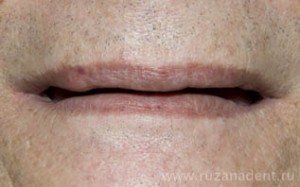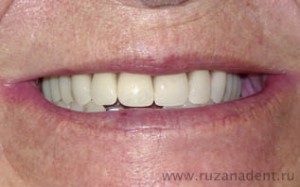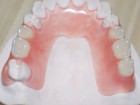Silicone dentures
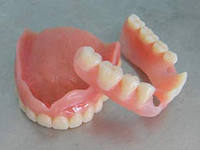
Silicone dentures are a fairly new direction in dentistry.
Silicone prostheses are practically no different from nylon, because nylon and silicone are used to make partial and full flexible prostheses.
In modern orthopedics, silicone is used quite often, although it should be noted that the definition of "silicone dentures" is not entirely accurate.
What is a silicone denture
Of silicone in the manufacture of removable dentures consists only of the basis of the design, and sometimes the fastening.
Silicone dentures include various types of flexible removable structures used for both partial and complete prosthetics.
Silicone tooth constructions can be used in case of loss of one or several teeth.
Advantages and disadvantages
Compared with acrylic dentures, silicone dentures have the following advantages:
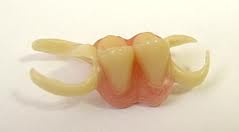
- They are more subtle.
- More comfortable, because they do not exert pressure on the gums and adjacent teeth.
- Securely fixed to the jaw. The design fits snugly to the sky.
- Their installation does not require turning of adjacent teeth.
- Hypoallergenic.
- They look aesthetically pleasing and invisible to others.
Along with the advantages, silicone designs are not without drawbacks:
- Fixation with clasps, which can cause sagging gums and injure the mucous membrane.
- Atrophic changes in bone tissue associated with pressure and increased friction of the prosthesis on the mucous membrane on one side of the jaw. If the design is installed on 1 - 2 teeth - such changes are unlikely.
- Frequent denture change associated with gum tissue subsidence.
- Do not withstand prolonged chewing loads. For this reason, many experts do not recommend placing silicone prostheses on the lower jaw.
- High cost. Nylon dentures cost 4-5 times higher than plastic ones.
- Frequent visits to the dentist, due to the fact that the silicone prosthesis is not polished, bacteria settle on its rough surface, which form a hard coating and cause the appearance of halitosis. Only a doctor can remove such formations from the structure.
- Long addictive.
- Short service life.
All of these disadvantages make the use of such prostheses not frequent. But, if there is a need to install a small design for 1-2 teeth, then these shortcomings can be neglected, because in general they will not be so obvious.
Video: Flexible prosthesis
Manufacturing technology
Stages of manufacturing silicone dentures:
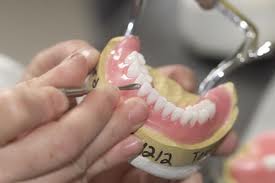
- Preparation for prosthetics. The teeth are cleaned as much as possible of various deposits, caries is treated, dental defects are sealed. If necessary, teeth whitening is performed.
- Taking casts on which a jaw layout is created.For the manufacture of molds, a special impression spoon and plastic mass are used.
- Making a jaw layout. In the laboratory, casts are filled with gypsum, which after hardening takes on the shape of a tooth and jaw.
- Based on the obtained model, silicone dentures are made.
Installation
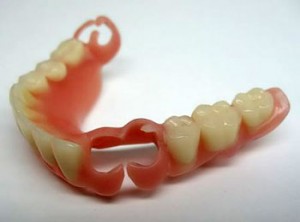
Before installing silicone prostheses, it is necessary to evaluate other possible prosthetics. Due to the fact that this construction technology is a novelty, patients using prostheses made of silicone complain about the inconvenience that occurs when they are worn.
Silicone prostheses are fixed to the abutment teeth using clasps. If there is nothing to attach removable silicone prostheses to, then implants can be used, which, after being implanted into the bone, become a support for the structure.
Life time
Silicone dentures are durable. They are resistant to various dyes. Soft silicone dentures have a lifespan of 5 years or more. With proper care and regular dental check-ups, you can extend the life of this design.
If the structure has broken, cracked, loosened, cracked, you should immediately contact a specialist. Do not repair the prosthesis yourself, because it can aggravate the condition of the structure.
Care
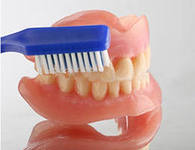
Silicone removable dentures are very moody in the care. Sometimes, when using unsuitable cleaning products, an unpleasant odor may come from the structure and the color of the base may change.
- Therefore, the cleaning of prostheses from silicone must be carried out using special toothpastes, which remove the formed plaque and have a disinfecting effect.
- It’s worth shooting them just before bedtime. It is recommended to place them in a glass with a disinfectant solution.
- When cleaning dental structures, it is necessary to keep them above a container of water or above a double towel folded in several layers. This will prevent them from breaking when falling.
- Do not put dentures in hot water - this will lead to their deformation.
- Constructions should not be dry. For storage, it is better to put them in a disinfectant solution.
- Daily hygienic care of the oral cavity and the construction of a toothbrush with paste will help remove plaque deposits and food debris, and also protect the prosthesis from staining.
- In the mornings, before using the design, you need to brush your teeth, gums, cheeks, palate, tongue with a soft bristle brush. This will improve blood circulation in the tissues.
Prices for installing silicone dentures
- The cost of prostheses made of silicone is quite high, given all the shortcomings of this design. In various regions of the country, silicone dentures have reasonable prices. In various clinics, the cost of such prostheses ranges from 30,000 to 35,000 rubles.
- There is a cheaper type of silicone, but no self-respecting specialist will guarantee the quality and durability of such dental designs.
The cost of various dentures
| Type of denture | Price |
| Silicone prosthesis | 30,000 - 35,000 rubles |
| Partial prosthesis made of acrylic plastic | 3000 - 5000 rubles |
| Full acrylic prosthesis | 8000 - 10000 rubles |
| Clasp denture | 18,000 rubles |
Questions and answers:
Question: How long does it take to get used to silicone dentures?
Answer: Addiction occurs, usually within a few weeks. In this case, the patient may experience discomfort, a feeling of heaviness of the prosthesis in the mouth. There is increased salivation, soreness, irritation. Sometimes addiction is delayed for several months.
Question: How long do dentures last?
Answer: Dentures can wear out. After some time, they will need a correction. In order for the design to last longer, it is necessary to visit the dentist at least once a year.
Before and after pictures
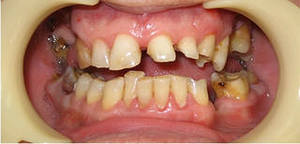 |
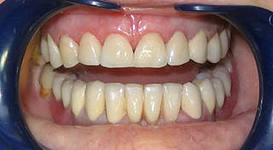 |
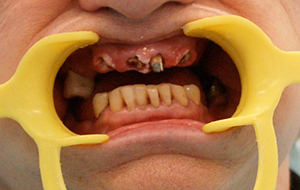 |
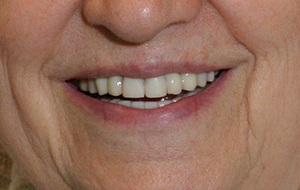 |

